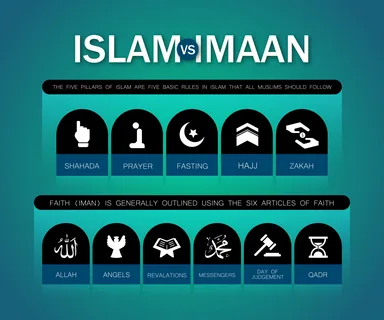Iman Islam, often referred to simply as Iman, is a fundamental concept within the Islamic faith. It encapsulates the core beliefs that form the foundation of a Muslim’s worldview. In this exploration on Arabian Tongue website, we will delve into the intricate aspects of Iman, examining its significance in daily life, its role in shaping Islamic practices, and its enduring relevance in a rapidly changing world.
Understanding the Core Tenets of Iman

- Belief in Allah: At the heart of Iman lies an unwavering belief in Allah, the singular and omnipotent deity in Islam. This foundational tenet forms the bedrock of a Muslim’s faith, emphasizing the oneness and absolute sovereignty of the Creator.
- Prophethood: Iman extends beyond a mere acknowledgment of a higher power; it involves embracing the prophethood of figures like Muhammad, who brought divine guidance to humanity. Understanding the teachings of these prophets is integral to the practice of Iman.
- Angels: The belief in angels adds a celestial dimension to Iman, emphasizing the unseen forces that operate in alignment with Allah’s divine plan. This aspect of Iman reinforces the interconnectedness of the spiritual and material realms.
Significance of Iman Islam
Iman, often translated as faith or belief, holds great significance in Islam. It is a central concept that encompasses a Muslim’s acceptance and conviction in the core tenets of the Islamic faith. The term Iman is derived from the Arabic root word “amana,” which means to believe, trust, or have faith.
Here are some key aspects of the significance of Iman in Islam:
- Pillar of Islam: Iman is considered one of the six pillars of faith in Islam. The other five pillars are the declaration of faith (Shahada), prayer (Salah), charity (Zakat), fasting during the month of Ramadan (Sawm), and pilgrimage to Mecca (Hajj). These pillars serve as the foundation of a Muslim’s practice and belief.
- Shahada (Declaration of Faith): The central expression of Iman is the Shahada, the testimony of faith, which states, “La ilaha illallah, Muhammadur Rasulullah” meaning “There is no god but Allah, and Muhammad is the messenger of Allah.” Uttering and sincerely believing in this declaration is the starting point of Iman.
- Belief in the Unseen: Iman involves belief in aspects of the unseen, such as Allah, angels, divine scriptures, prophets, the Day of Judgment, and predestination (Qadar). Muslims are required to have faith in these elements even though they are beyond human perception.
- Guidance and Morality: Iman provides a moral and ethical framework for the life of a Muslim. Believers are expected to follow the guidance provided in the Quran and the teachings of Prophet Muhammad (peace be upon him) to lead a righteous and just life.
- Striving for Excellence: Iman encourages Muslims to strive for excellence in all aspects of life, seeking knowledge, engaging in acts of kindness, justice, and contributing positively to society. The belief in the accountability on the Day of Judgment motivates individuals to live a life that aligns with Islamic principles.
- Relationship with Allah: Iman strengthens the bond between the believer and Allah. It involves love, fear, hope, and gratitude toward the Creator. Maintaining a strong connection through acts of worship, such as prayer and supplication, is integral to nurturing Iman.
- Tests and Trials: Iman is often tested through various trials and challenges in life. The ability to maintain faith during difficult times and to be patient in the face of adversity is seen as a manifestation of strong Iman.
Iman and Islamic Practices

- Prayer and Iman: Prayer, or Salah, is a cornerstone of Islamic practice and a tangible expression of Iman. It serves as a direct line of communication between the believer and Allah, fostering a sense of devotion and spiritual closeness.
- Charity as an Expression of Iman: Zakat, or charitable giving, is not just a financial obligation but also a manifestation of Iman’s compassionate ethos. Through acts of charity, Muslims actively demonstrate their commitment to social justice and communal well-being.
- Fasting and Iman: The month of Ramadan, marked by fasting from dawn to dusk, is a period where Iman is intensified. Fasting instills self-discipline and empathy, reinforcing the spiritual dimensions of Iman.
- Iman as a Moral Compass: In navigating the complexities of daily life, Iman serves as a moral compass, guiding ethical decision-making and fostering a sense of responsibility towards oneself and others.
- Iman in Decision-Making: From personal choices to professional decisions, Iman provides a framework for Muslims to navigate life’s challenges. It encourages thoughtful reflection and consideration of ethical implications.
Challenges to Iman
Doubt and Faith
Doubt can be a natural part of any faith journey. Iman, however, encourages believers to confront doubt, seeking knowledge and understanding to strengthen their convictions.
In a world filled with diverse ideologies and influences, maintaining Iman requires a conscious effort to align oneself with Islamic principles while adapting to contemporary contexts.
Iman and Interfaith Dialogue
Iman encourages an open dialogue with people of other faiths, fostering mutual understanding and respect. Interfaith discussions provide opportunities to share perspectives and build bridges of coexistence.
Iman in Historical Context
Examining the historical evolution of Iman unveils its enduring nature. Across centuries, Iman has been a source of resilience for individuals and communities facing diverse challenges.ssions of Imane
Iman in the Digital Age
Challenges and Opportunities
The digital age presents both challenges and opportunities for practicing Iman. While online platforms offer spaces for virtual communities, they also pose challenges to maintaining a balance between the virtual and the real.
Virtual Communities and Iman
Online forums and social media provide avenues for Muslims to connect globally. Virtual communities can enhance Iman by facilitating knowledge-sharing and fostering a sense of global unity.
Learn Now: Islamic Studies Course Online For Kids
FAQs
Is Iman Islam only about belief in Allah?
No, Iman encompasses belief in Allah, prophethood, angels, and various other facets that form the foundation of Islamic faith.
How does Iman contribute to personal growth?
Iman fosters spiritual development and resilience, contributing to ongoing personal growth and a sense of purpose.
Can Iman coexist with modern influences?
Yes, Iman encourages believers to adapt to contemporary contexts while upholding Islamic principles.
What role does community play in strengthening Iman?
Community engagement, through prayers and support networks, plays a crucial role in nurturing and strengthening Iman.
Confronting doubt involves seeking knowledge and understanding to strengthen one's convictions.
Conclusion
In conclusion, Iman is not just a set of beliefs; it is a dynamic force that shapes the lives of millions of Muslims worldwide. From its core tenets to its applications in daily life, Iman serves as a guiding light. As the world continues to change, Iman remains a constant, offering solace, direction, and a sense of purpose.


